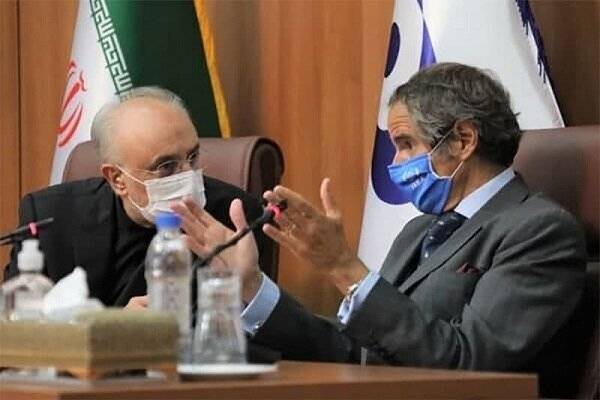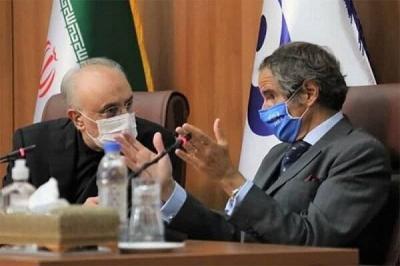The International Atomic Energy Agency (IAEA) and Iran announced their agreement to continue inspections of Iran's nuclear facilities for three months.
IAEA Director General Rafael Grossi confirmed in a joint statement with the head of the Iranian Atomic Energy Organization, Ali Akbar Salehi, that they agreed on Iran's commitment to the nuclear deal and the continuation of inspection activities for three months. Grossi clarified that the agency's relationship with Iran focuses on technical aspects rather than political, emphasizing that there was an agreement for a regular review of technical understandings to ensure their objectives are met. He noted that the measures to be implemented are not a substitute for the comprehensive agreement but rather understandings that allow a gradual return to the nuclear deal, indicating a reasonable outcome from the talks in Iran.
The IAEA Director General mentioned that the effects of Iran's reduced cooperation with the agency would be mitigated by the agreement reached today. He added that the Iranian law regarding the reduction of cooperation would be applied, and consequently, the Additional Protocol would be suspended, while indicating that Tehran would continue to implement the agreement with the IAEA without restrictions.
On Saturday, IAEA Director General Rafael Grossi began a two-day visit to Tehran, just a day before Iran's deadline for reducing the work of international inspectors if U.S. sanctions were not lifted. At the same time, U.S. President Joe Biden called for diplomatic cooperation regarding the Iranian nuclear file. For its part, Iran announced that it had fruitful discussions on Sunday with the IAEA Director General, who was visiting just two days before the implementation of a law that would reduce the work of international inspectors if U.S. sanctions were not lifted.
The Iranian step, set to take effect on Tuesday, is the latest in a series of measures Tehran has taken since 2019, stepping back from many of its commitments under the nuclear deal following Washington's withdrawal from it in 2018. Upon his arrival in Tehran, Rafael Grossi met with Iranian Atomic Energy Organization head Ali Akbar Salehi, followed by a meeting with Foreign Minister Mohammad Javad Zarif. Kazem Gharib Abadi, Iran's ambassador to the IAEA based in Vienna, stated, "Iran and the IAEA had fruitful discussions based on mutual respect, and the results will be published this evening," via Twitter after attending the Salehi-Grossi meeting.
Iran has previously confirmed that the implementation of a parliamentary decision will not lead to a complete cessation of inspector activities or their expulsion, a stance reiterated by Zarif on Sunday, while warning that Tehran would continue to reduce its commitments unless the other parties return to their obligations, particularly concerning the lifting of sanctions. It is noteworthy that Iran gave the Biden administration until February 23 to lift the sanctions imposed by former President Donald Trump, or it would halt the surprise inspections conducted by the IAEA under the nuclear deal.
On February 8, Iran's permanent representative to the United Nations, Kazem Gharib Abadi, announced that they had officially informed the IAEA of their intention to withdraw from the Additional Protocol applied under the Treaty on the Non-Proliferation of Nuclear Weapons starting February 23. This follows the Iranian Constitutional Council's approval of a bill late last year aimed at accelerating nuclear activities and restricting inspections of nuclear facilities, requiring the Iranian Atomic Energy Organization to commence uranium enrichment at levels of at least 20% and to increase its stock of low-enriched uranium.
Former President Trump withdrew from the nuclear agreement with Iran, signed in 2015, in 2018 and reinstated harsh sanctions on Tehran.




